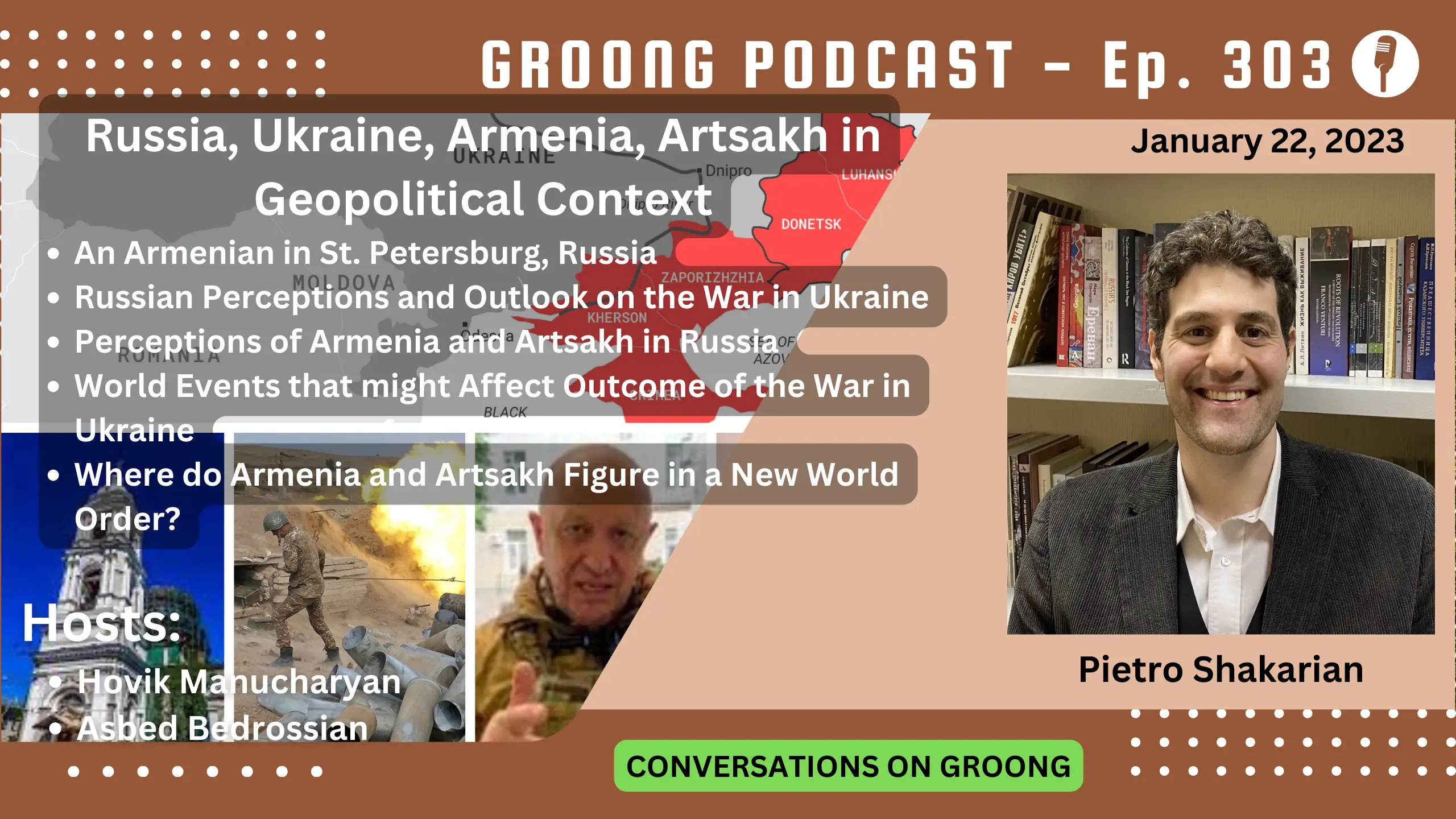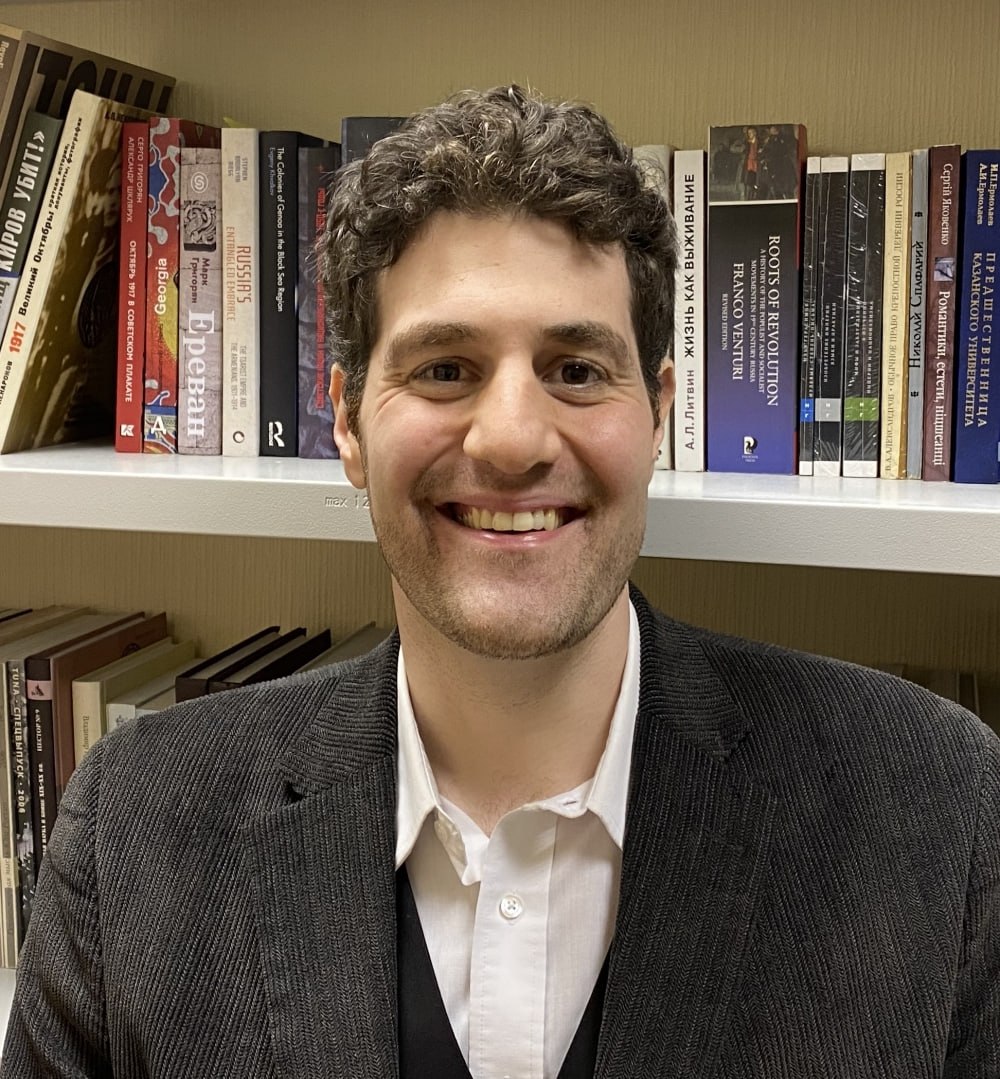
Groong Links:
Guest:
Topics:
- An Armenian in St. Petersburg, Russia
- Russian Perceptions and Outlook on the War in Ukraine
- Perceptions of Armenia and Artsakh in Russia
- World Events that might Affect Outcome of the War in Ukraine
- Where do Armenia and Artsakh Figure in a New World Order?
Episode 303 | Recorded: January 22, 2024
Show Notes
An Armenian in St. Petersburg
How is life in Saint Petersburg, Russia?
For the past couple of years the mainstream Western press has pushed a narrative that Russia is on the verge of collapse due to the ongoing war in Ukraine. But just in the last 6 months this has started shifting, and there are reports that the US and some EU countries are pushing Ukraine to find a negotiated settlement with Russia.
Since you left Yerevan a year and a half ago, you’ve lived in St. Petersburg.
Questions:
- Can you tell our listeners what life is like over there, and if you’ve seen a change since the time since you moved there?
- How do you assess the current situation, domestically, in Russia?
- Have western sanctions had an impact on life in Russia?
- You were there during the “Wagner Opera”. This was the period last summer when Prigozhin’s Wagner Group tried some sort of a putsch against either Putin or the Russian defense ministry. In any case, the Kremlin dealt with it within something like 36 hours. What was that experience like? Was there widespread support for Prigozhin’s “revolt”?
- What are the perceptions of Armenia and Artsakh in St. Petersburg?
Geopolitical Developments
Russia & Ukraine
This is an event that’s had immense consequences on Armenia’s geopolitical fate; but it’s not just that, this is a worldwide event with global consequences. Most observers are waiting to see how the war in Ukraine will shake out, because they expect that its outcome will determine the so-called “new world order”.
About 6-7 months ago, people like former British Prime Minister Boris Johnson were visiting Kiev and making sure that Zelensky would not hold any peace talks aimed at ending or even “freezing” the conflict. Since then, a lot has happened. As we noted earlier, tens of billions of dollars later, western support for the war is on the rocks.
Questions:
- Where does the war stand today? Who’s winning, who’s losing, or maybe it’d be more politically correct to ask: are there winners and losers in this war?
- What should we keep track of, as this war unfolds? What’s likely to happen next?
World Currents
In the past year many new world events are developing, some expected and some not. For example, the US elections are upon us, and even though most people would think it’s something for 2024, we’ve been feeling its tremors since the middle of 2023. Meanwhile, the Israel-Gaza war was an unexpected turn of events in October, 2023.
Questions:
- Regarding the US election, first of all how is the election year affecting US support for Ukraine? And perhaps the bigger question is: how will a potential Trump presidency affect this conflict, and more generally maybe all of the world, because it reflects through the prism of a totally different relationship between Russia and the US under Trump.
- How is the war in Gaza affecting the war in Ukraine, and perhaps more specifically, western solidarity with Ukraine? It seems to me either the West’s attention, or resources, have been split between these two crises, and now the west doesn’t have the same diplomatic and war bandwidth as before.
Just in the past couple of weeks Iran has flexed its muscle and escalated its political profile in the Middle East by striking at the US consulate in Iraq, and Sunni militants in Pakistan. Iran and Russia have grown nearly to the point of strategic partnership since the war in Ukraine, and with Iran entering BRICS as of January 1, its economic integration with the non-western world becomes a prominent plus for it.
Question:
- What’s your assessment of Iran’s emerging influence, both regionally and on the world stage?
Back to Armenia and the South Caucasus
Let’s tie all these things we’ve been talking about back to how they affect Armenia and its outlook. For example, the war in Ukraine; the war in Gaza and its possible expansion to the entire Middle East; the US elections; the various global trade corridors, like the Northern corridor, the Middle corridor, INSTC, the Belt and Road, etc.
Questions:
- Where do Armenia and Artsakh factor into all this?
- Earlier, you were telling us that the recent crises in the region actually revealed that Armenia was much more geopolitically significant than many commentators previously assumed. What do you mean by this?
- What is Russia’s position towards the region, given all of the developments we’ve been discussing?
- What is your reading on the situation from St. Petersburg?
- What are Russian analysts saying?
- How will Russia’s stance evolve, as the war in Ukraine eventually resolves?
- Pashinyan’s government seems to have put most of its eggs in the West’s basket. Is this a wise move? Is it wise to pick sides at all?
Wrap-up
That’s our show! We hope you found it useful. Please find us on Social Media and follow us everywhere you get your Armenian news. Thanks to Laura Osborn for the music on our podcasts.
Guests

Pietro Shakarian
Dr. Pietro Shakarian is a historian of Russia and the Soviet Union. He is the author of the book Anastas Mikoyan: An Armenian Reformer in Khrushchev’s Kremlin. Dr. Shakarian’s analyses on Russian and post-Soviet affairs have appeared in The Nation, The Plain Dealer, and various other publications. He was previously a lecturer in history at the American University of Armenia in Yerevan.
Hosts

Hovik Manucharyan
Hovik Manucharyan is an information security engineer who moved from Seattle to Armenia in 2022. He co-founded the ANN/Groong podcast in 2020 and has been a contributor to Groong News since the late 1990s.
Disclaimer: The views expressed by Hovik Manucharyan on the ANN/Groong podcast are his own and do not necessarily reflect the opinions of his employer or any other organization.

Asbed Bedrossian
Asbed Bedrossian is an IT professional, and for years oversaw the central IT enterprise infrastructure and services at USC. His decades of experience spanned across IT strategy, enterprise architecture, infrastructure, cybersecurity, enterprise applications, data center operations, high performance computing, ITSM, ITPM, and more.
Asbed founded the Armenian News Network Groong circa 1989/1990, and co-founded the ANN/Groong podcast in 2020.